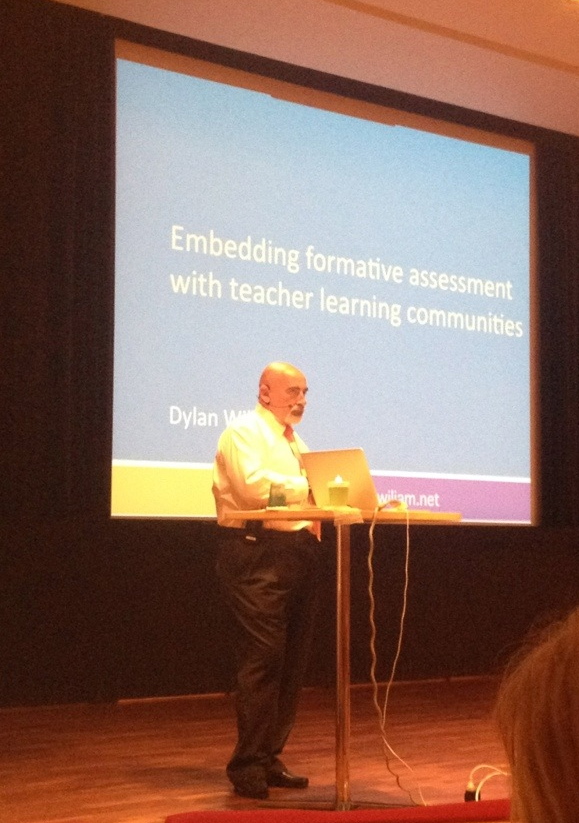“If you disagree with me, basically you’re wrong.”
Så inleder Dylan Wiliam sin eftermiddagsföreläsning “Embedding formative assessment with teaching learning communities” på Lärarnas Hus i Stockholm tisdagen den 21 maj 2013. Det fungerar naturligtvis – han får alla att lyssna intresserat.
Han fortsätter med att poängtera att vi behöver ”improve student achievement by improving teacher quality. Invest in the teachers we already have.” Och så ägnar han resterande tid åt att förklara hur man kan göra just detta, bland annat med hjälp av formativ bedömning.
 Dylan Wiliam spottar ur sig klokheter och oneliners i ett rasande tempo under eftermiddagens nästan tre timmar långa föreläsning. Han påminner en del om Sir Ken Robinson i sin föreläsningsstil, det vill säga han blandar allvar och humor med konkreta exempel och större sammanhang. Resultatet blir tre väl investerade och minnesvärda timmar. Detta trots att jag i princip lusläst hans senaste bok Att följa lärande, bland annat som referenslitteratur för min nya bok.
Dylan Wiliam spottar ur sig klokheter och oneliners i ett rasande tempo under eftermiddagens nästan tre timmar långa föreläsning. Han påminner en del om Sir Ken Robinson i sin föreläsningsstil, det vill säga han blandar allvar och humor med konkreta exempel och större sammanhang. Resultatet blir tre väl investerade och minnesvärda timmar. Detta trots att jag i princip lusläst hans senaste bok Att följa lärande, bland annat som referenslitteratur för min nya bok.
Här kommer en bråkdel av de oneliners Dylan Wiliam bjöd på under sin föreläsning:
”My nightmare is for someone to come up with a creativity test.”
”Some things can’t be tested but are still important, such as creativity.”
”Teaching takes place in time, learning takes place over time.”
”Every teacher needs help. Every teacher fails everyday. Show me a teachers that is not failing and I’ll show you a teacher who is either not paying attention or have low standards.”
”People think that formative assessment is about testing students more frequently but weighing the pig doesn’t make it fatter.”
”Assessment should be done with students, not to them.”
”How often should teachers do formative assessment? Not more than every five seconds.”
”Let me tell you a secret. Not all students are motivated.”
”Learning is a marathon, not a sprint.”
”Questioning should cause thinking and provide data that informs teaching while feedback should cause thinking and provide guidance on how to improve.”
”Plan your questions, ask them, shut up. For at least three seconds.”
”It’s not enough that students are quiet when other students are speaking, they should be listening.”
Som ni förstår var det en riktigt bra tisdagseftermiddag. 🙂